Team GB's London 2012 medal roll of honour
- Published
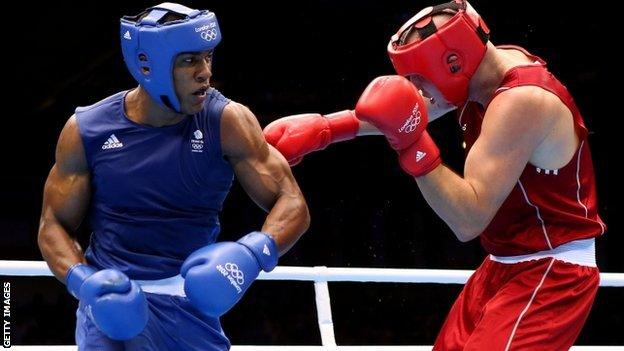
GOLD
BOXING - MEN'S SUPER HEAVYWEIGHT (+91KG)
How he did it: Joshua lands Team GB's 29th gold of the Games by beating 2008 champion, Roberto Cammarelle of Italy. Down three points after two rounds, Joshua fought back in the third and final round to level the tie at 18-18 and then win on count back.
Interesting fact: Joshua, 22, only took up boxing at the age of 18 after his cousin took him to Finchley Amateur Boxing Club.
BOXING - MEN'S BANTAMWEIGHT (56 KG)
How he did it: Campbell beats Ireland's John Joe Nevin in a tight final. Campbell edges the first round, Nevin the second before Campbell pulls clear to become the first Briton to win the bantamweight crown since 1908.
Interesting fact: Campbell, who took up the sport aged 13, was sidelined for 10 months in 2009 after splitting a tendon over a knuckle in his left hand.
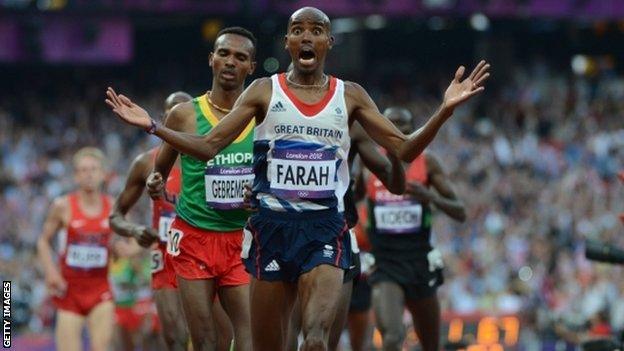
Mo Farah triumphed in the men's 5,000m to win his second gold of the Games
How he did it: Farah saw off a last lap challenge from Ethiopia's Dejen Gebremeskel to complete the 5,000m and 10,000m double, finishing with a time of 13:41.66., external
Interesting fact: Farah becomes the seventh man to take the 5,000m and 10,000m double, and the feat has been accomplished in successive Games, after Kenenisa Bekele of Ethiopia took both golds in Beijing.
CANOE SPRINT - 200m MEN'S SINGLE KAYAK
How he did it: By living up to his billing of "Usain Bolt on water" although unlike Bolt, McKeever - a 26-year-old trainee accountant - made a great start and never gave his rivals a sniff after that.
Interesting fact: McKeever is currently studying to qualify as an accountant.
How she did it: 19-year-old Jones beat China's Yuzhuo Hou 6-4, external to avenge her defeat by the Chinese fighter at last year's World Championships and claim Great Britain's first taekwondo gold.
Interesting fact: The people of Jones's home town of Flint clubbed together to raise the £1,600 she required to attend the qualifiers for the 2010 Youth Olympics in Singapore, where she won gold.
BOXING - WOMEN'S FLYWEIGHT (51KG), external
How she did it: Adams made history by winning the first gold medal awarded for women's boxing at an Olympic Games, beating some of the sport's biggest names before overcoming three-time world champion from China, Ren Cancan, in the final., external
Interesting fact: One of Adams's big loves is snowboarding but she has had to put it on hold until after the Olympics.
EQUESTRIAN - INDIVIDUAL DRESSAGE
How she did it: Competing to movie themes including Live and Let Die, Dujardin and her horse Valegro won Great Britain's first individual dressage gold medal with a score of 90.089 points to put her above the nearest challenger Adelinde Cornelissen of the Netherlands.
Interesting fact: Dujardin was part of the British team that made history by winning the team dressage event for the first time.
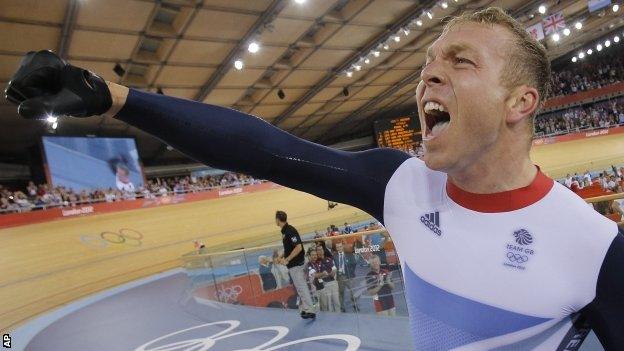
Sir Chris Hoy secured his sixth Olympic gold in the men's keirin
How he did it: Hoy won a remarkable keirin final to take gold with a time of 10.306, external in what will almost certainly be his last Olympic race.
Interesting fact: Winning his sixth gold medal makes Hoy the most decorated British Olympian of all time, surpassing Sir Steve Redgrave's five golds.
How she did it: The six-event discipline went down to the time trial where Trott, up against her closest rival Sarah Hammer, needed to finish at least three places above the American in the final event. Trott finished first with Hammer fourth, and the Brit picked up her second gold of the Games.
Interesting fact: Trott was born with a collapsed lung and also had to overcome a struggle with asthma throughout her youth.
LAURA BECHTOLSHEIMER - CARL HESTER - CHARLOTTE DUJARDIN
How they did it: Over the two-day Grand Prix in the first week of the Games, Charlotte Dujardin and her horse Valegro set an Olympic record. The team continued their good performance before Dujardin and Valegro's final display confirmed Team GB's 20th gold of the games.
Interesting fact: Britain's biggest rivals in the dressage competition, Germany, purchased a horse from the Netherlands dressage team for a fee believed to be in excess of £10m in 2011. However, the horse's rider Matthias Rath fell ill before the Games and both were forced to withdraw from London 2012.
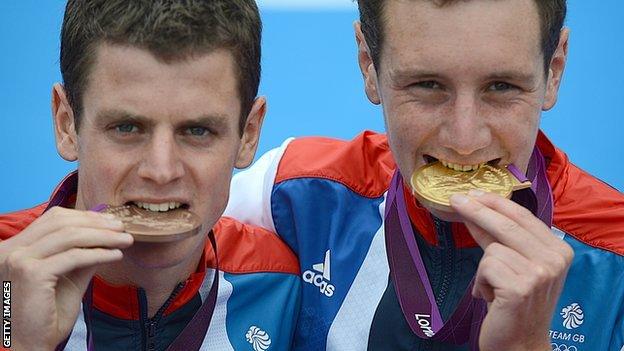
Alistair (right) and Jonny (left) Brownlee with their gold and bronze medals in the triathlon
How he did it: Brownlee swam, cycled and ran a perfect race to live up to his pre-Games billing as one of the gold medal favourites for Team GB, finishing in a time of one hour 46 minutes and 25 seconds., external His younger brother Jonny won bronze as Spain's Javier Gomez took silver.
Interesting fact: In 2006, Alistair quit a degree in medicine at Cambridge University to move back home to Yorkshire and focus on his triathlon training.
CYCLING - MEN'S SPRINT, external
How he did it: Kenny faced world champion Gregory Bauge of France in the final. Having won the first race, Kenny led out from the front in the second and took the gold by holding his opponent off on the line.
Interesting fact: Kenny was selected ahead of Sir Chris Hoy to represent Great Britain in the event, and the 24-year-old repays the faith shown in him by winning his third Olympic gold medal.
NICK SKELTON - BEN MAHER - SCOTT BRASH - PETER CHARLES
EQUESTRIAN - MEN'S TEAM SHOWJUMPING, external
How they did it: After both sides finished with eight penalty points from their final rounds, the competition went to a jump-off against Netherlands for the gold medal. Marc Houtzager knocked a fence over for the Dutch in the final ride, and Peter Charles completed a flawless round to give the men gold.
Interesting fact: The victory gives Great Britain their first team showjumping medal since the Helsinki Olympic Games in 1952.
How he did it: The British number one beat Switzerland's Roger Federer in straight sets at Wimbledon 6-2 6-1 6-4,, external saying it was "the biggest win of my life".
Interesting fact: Rangers Football Club asked Murray to train at their school of excellence at the age of 15. He declined and focused on his tennis career instead.
How he did it: Ben Ainslie clinched his fourth straight gold medal to become the most decorated Olympic sailor in history. The 35-year-old, who also won silver in 1996, overtakes Dane Paul Elvstrom, who won four golds up to 1960. Ainslie came ninth in a tense Finn medal race to edge long-time regatta leader Jonas Hogh-Christensen of Denmark into silver.
Interesting fact: Ben's actual first name is Charles but he takes "Ben" from his middle name Benedict.
How he did it: Farah ran a perfect race in the 10,000m final, banishing his Beijing demons to take take gold with a time of 27:30.42., external
Interesting fact: He was born in Mogadishu in Somalia, and moved to England at the age of eight. His father was born in England and grew up in Hounslow, just 20 miles from the Olympic Stadium.
How he did it: Rutherford set a distance of 8.31m in the fourth round of the final and nobody could match it in the remaining jumps.
Interesting fact: The last time Great Britain had two men in the final of the Olympics long jump was the last time they won it, Lynn Davies grabbing gold back in 1964.
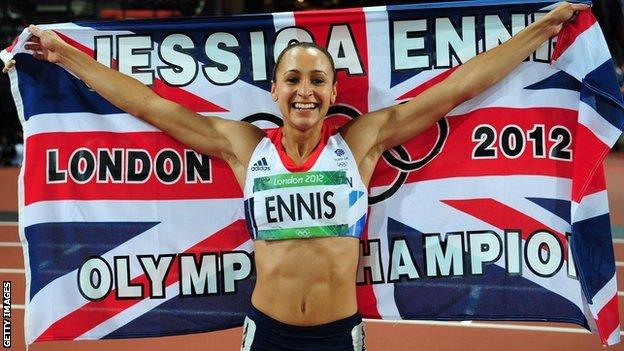
Ennis lived up to her billing as the poster girl of the Games
How she did it: The London 2012 poster girl from Sheffield dominated from start to finish, leading overnight into the second day. She clinched gold with a dramatic 800m win.
Interesting fact: The 100m hurdle time that Ennis posted during the London 2012 heptathlon would have won her the gold medal in Beijing for the individual event.
LAURA TROTT - DANI KING - JOANNA ROWSELL
CYCLING - WOMEN'S TEAM PURSUIT
How they did it: The women's trio of King, Trott and Rowsell seal gold over United States of America with an emphatic victory, clocking a world record time of 3:14.051., external
Interesting fact: The GB cyclists have racked up six straight world records, and nine in total so far at the Games.
KATHERINE COPELAND - SOPHIE HOSKING
ROWING - WOMEN'S LIGHTWEIGHT DOUBLE SCULLS
How they did it: Great Britain trail Greece and China in the early stages but time their assault perfectly, overhauling the Chinese pair before closing on the Greece boat by halfway and establishing a clear lead with 500m left.
Interesting fact: Hosking's father, David, won a world championship gold in 1980 as part of the Lightweight Eight.
ANDY TRIGGS HODGE - PETE REED - ALEX GREGORY - TOM JAMES
How they did it: In an event Great Britain has dominated in recent years having won the three previous golds, the crew of Triggs Hodge, Reed, Gregory and James held off the challenge of their main rivals Australia.
Interesting fact: Tom James took up rowing after a knee injury forced him to give up running. He was diagnosed with an irregular and rapid heart beat at the beginning of 2012 but says it is under control after treatment.
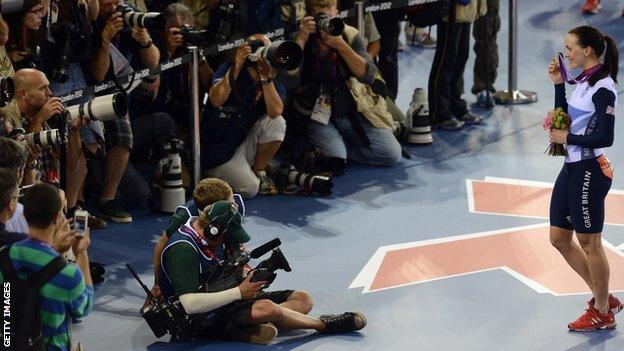
Victoria Pendleton poses for the world's media after winning the keirin
CYCLING - WOMEN'S KEIRIN, external
How she did it: Aussie Anna Meares had taken the early lead but Pendleton stormed around the outside of her rivals and held off Shuang Guo on the line to narrowly claim the gold medal.
Interesting fact: Pendleton becomes the first ever female winner of the keirin in an Olympic Games.
STEVEN BURKE - ED CLANCY - GERAINT THOMAS - PETER KENNAUGH
CYCLING - MEN'S TEAM PURSUIT SPRINT, external
How they did it: The quartet were defending their gold medal that they won in Beijing, and did so in superb fashion, beating opponents Australia by nearly three seconds and in a world record time of 3:51.659.
Interesting fact: The men's team pursuit was first in the Olympics in London 1908 where Great Britain took gold over the shorter distance of 1.8km.
KATHERINE GRAINGER - ANNA WATKINS
ROWING - WOMEN'S DOUBLE SCULLS
How they did it: Grainger and Watkins held off Australia to win the women's double sculls, with Poland taking the bronze. The pair, unbeaten since teaming up in 2010, exploded out of the blocks to take an early lead ahead of the Australian crew of Brooke Pratley and Kim Crow. By halfway, they had extended their lead and pulled into clear water to earn Britain a sixth gold.
Interesting fact: Grainger is Britain's most successful female rower, with silver medals at each of the three Olympics prior to London.
CHRIS HOY - PHILIP HINDES - JASON KENNY
How they did it: Team GB clinched gold in the men's team sprint at the velodrome, setting a new world record of 42.600 seconds in the process.
Interesting fact: Sir Chris Hoy now has five Olympic golds to his name, equalling the achievements of Sir Steve Redgrave.
How he did it: The Dorset man finished two shots clear of Sweden's Hakan Dahlby. Russia's Vasily Mosin was third.
Interesting fact: Peter Wilson is the world record holder in shooting's double trap. He scored 198 out of 200 at a World Cup event in Arizona in March, surpassing the previous record of 196 set in 2009.
How they did it: The Britons, who are ranked sixth in the world, produced an error-free run to take a shock win and claim Britain's first ever canoe slalom gold at the Lee Valley White Water Centre.
Interesting fact: Etienne Stott was named Bedford Sports Personality of the Year in 2008.
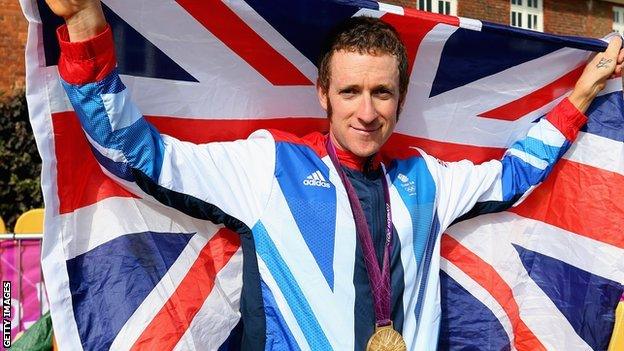
Bradley Wiggins after winning gold
CYCLING - ROAD - MEN'S INDIVIDUAL TIME TRIAL
How he did it: Having barely taken off his yellow jersey, the Tour de France winner clinched gold in the Olympic time trial with a time of 50 minutes and 39 seconds. Wiggins completed the 44km course through the streets of London's commuter belt an impressive 42 seconds ahead of Germany's world champion Tony Martin.
Interesting fact: With seven Olympic medals to his name, Bradley Wiggins has more than any other British Olympian.
HELEN GLOVER - HEATHER STANNING
How they did it: Four years ago, Helen Glover was an aspiring hockey player and Heather Stanning was embarking on a career in the Army. Now they are Olympic champions having led from the front in the women's pair final. They become the first women to win rowing gold for Great Britain and the country's first gold medallists at the 2012 games.
Interesting fact: Heather Stanning's school yearbook, external predicted that she would be their first Olympic gold winner.
SILVER
How she did it: Murray won Team GB's 65th and final medal of London 2012 following an inspired finish in modern pentathlon's run-shoot finale. Starting eight seconds off the lead in fourth, Murray slipped back into the pack before surging into second.
Interesting fact: As a teenager, Murray was kicked out of the GB modern pentathlon development programme because she couldn't cope with the demands. She consequently took a two-year break from the sport in order to concentrate on her A-Levels.
BOXING - MEN'S WELTERWEIGHT (69KG)
How he did it: Evans beat world champion Taras Shelestyuk of Ukraine in the semi-finals, but in the final he was outboxed by Kazakhstan's Serik Sapiyev, who won his country's third successive Olympic gold at this weight.
Interesting fact: In June 2011 Evans made history alongside his team-mate and close friend, Andrew Selby, when they became the first Welshmen for 86 years to win gold at the European Championships.
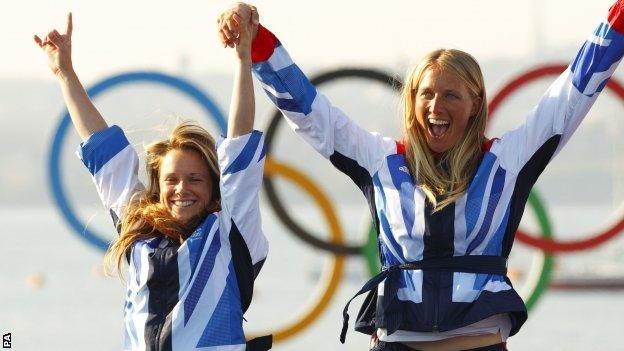
How they did it: Hannah Mills and Saskia Clark started the day on level points with the New Zealand crew but failed to overhaul their rivals. The Kiwis claimed gold with Britain taking silver.
Interesting fact: In 2002, Hannah Mills was voted UK Young Sailor of the Year.
LUKE PATIENCE - STUART BITHELL
How they did it: The British duo were already guaranteed at least a silver medal and went into the final race needing to beat Australia, with one boat between them, to clinch gold. Patience and Bithell led around the first mark, but Aussies Mathew Belcher and Malcolm Page moved clear to win.
Interesting fact: Luke Patience has a pre-event superstition of tasting the water he is due to sail in, the night before his first race.
How she did it: She lost out to close rival Anna Meares in the second race after being relegated in the first for leaving her lane. It was Pendleton's last ever Olympic race.
Interesting fact: Victoria's father Max was a grass track English national champion.
How he did it: Dempsey pushed himself into second in the overall standings with five races remaining and needed sixth place on the final day to claim silver. He came third in the medal race to leave the result in no doubt.
Interesting fact: The 31-year-old from Norwich was also second going into the medal races in Beijing, but ended up finishing fourth.
How she did it: The defending champion did it the hard way. Drawn in lane eight after finishing second in her semi-final, she was well outside the medals coming off the final bend but a strong finish saw her close on the leaders, with Sanya Richards-Ross holding on for the gold by just 0.15 seconds., external
Interesting fact: Ohuruogu has only run under 50 seconds three times - in her two Olympic finals and the 2007 world championships, earning two golds and a silver in the process.
How they did it: The newly-crowned men's singles champion joined 18-year-old Robson to face number one seeds, Victoria Azarenka and Max Mirnyi. The British pair won the first set 6-2, but the Belarusians fought back to win the second 6-3 and then a "champions tie-break" 10-8.
Interesting fact: Murray commenced play in the mixed doubles final just one hour and 15 minutes after the end of his singles final triumph.
GYMNASTICS - MEN'S POMMEL HORSE
How he did it: Louis Smith won a dramatic gymnastics silver medal on the pommel horse, missing out on gold by the narrowest margin after his overall score tied with Hungary's Krisztian Berki. Both Smith and Berki scored 16.066, external but Berki was awarded the Olympic gold by virtue of having a fractionally higher execution score.
Interesting fact: Smith wants to start his own fashion brand after London 2012.
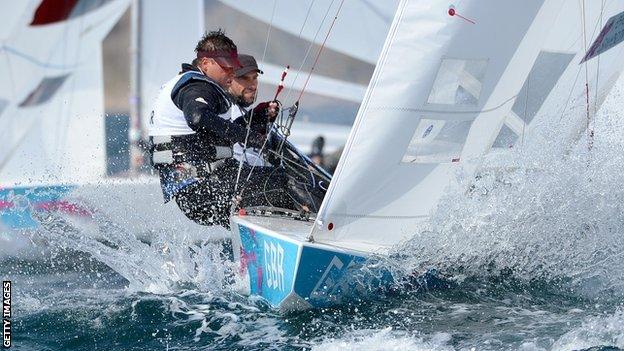
Star sailors - Ian Percy and Andrew Simpson
How they did it: Iain Percy and Andrew Simpson were denied a consecutive Olympic gold as Sweden won the final medal race to clinch the Star title in Weymouth. The British pair led going into the final but finished eighth as Sweden's Fredrik Loof and Max Salminen won. GB finished on 34 points, two behind Sweden, with Brazil on 40 points.
Interesting fact: Andrew Simpson's nickname is Bart, named after the cartoon character in the American television programme The Simpsons.
ROWING - MEN'S LIGHTWEIGHT DOUBLE SCULLS
How they did it: After a restart brought about when Purchase's seat broke, the British pair set the early pace and looked set to add Team GB's 11th gold and third of the day only for Denmark to fight back from half a boat down and take the lead with 100m left.
Interesting fact: Had Purchase's seat broken slightly later - after the 100m mark - the British pair would not have been included in the restarted race.
How she did it: The London-born judoka won a superb silver as she was finally beaten by two yuko scores in the 78kg final by American Kayla Harrison. The world number 33 became Great Britain's first Judo medalist in 12 years.
Interesting fact: Gemma Gibbons does not look at the draw for her 78kg weight at competitions until the morning she fights, usually after the weigh-in and breakfast.
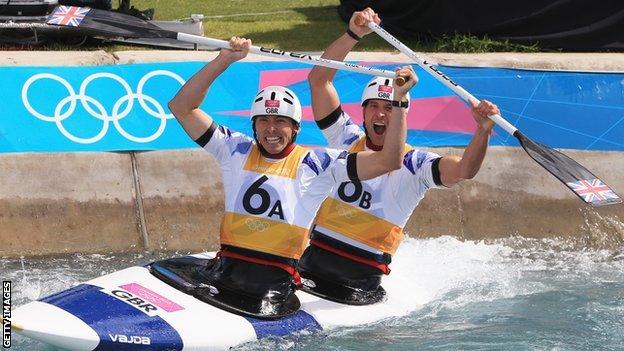
David Florence and Richard Hounslow celebrate silver
How they did it: David Florence and Richard Hounslow took silver in the Canoe Slalom men's double as team-mates Tim Baillie and Etienne Stott claimed Britain's first ever gold in the event.
World number nine pair Florence and Hounslow were the fastest in the semi-finals and therefore had the honour of going last. They were up on the lead time until the final sector, but just missed out to take their first Olympic silver as a pair.
Interesting fact: Before the 2008 Olympic Games Florence applied to become an astronaut in response to an advert he had seen, and was so serious about it that he began learning Russian but was not one of the four people selected by the European Space Agency.
CHRIS BARTLEY - RICHARD CHAMBERS - PETER CHAMBERS - ROB WILLIAMS
ROWING - MEN'S LIGHTWEIGHT FOUR
How they did it: Starting as favourites, Team GB sat in third place for much of the 2,000m with Denmark out in front. Entering the final 500m they made a push for the lead but, in a tight finish, were pipped by South Africa who came from the back to take their first Olympic rowing gold. Denmark, leaders for almost the entire race, had to settle for the bronze.
Interesting fact: The Chambers duo became the first British brothers to win an Olympic medal since Greg and Jonny Searle took bronze in the coxless four at the 1996 Atlanta Olympics.
SWIMMING - MEN'S 200M BREASTSTROKE
How he did it: Jamieson did everything he could possibly do, but Hungary's Daniel Gyurta held him off, breaking the world record in the process.
Interesting facts: Britain's Jamieson broke the British record in the final with a time of 2:07.43. His mother was also a competitive swimmer and his father played professional football for Hearts amongst other clubs.
TINA COOK - WILLIAM FOX-PITT - MARY KING - ZARA PHILLIPS - NICOLA WILSON
How they did it: A Great Britain team including the Queen's grand-daughter Zara Phillips, finished behind Germany following a dramatic tussle with New Zealand. Holding a narrow lead over the Kiwis as the last riders prepared to go, Tina Cook sealed second place by collecting just one penalty.
Interesting fact: Zara Phillips received her medal from her mother Princess Anne, who competed in the 1976 Olympics in Montreal. Her father, Captain Mark Phillips, was a member of the British three-day eventing team that won gold in Munich in 1972.
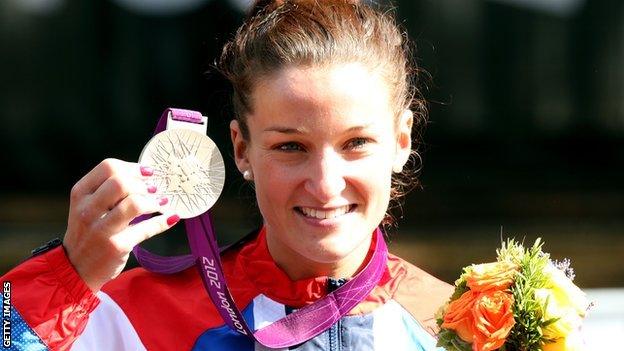
Lizzie Armitstead switched from track cycling to road racing
How she did it: Bronze medallist Russian Olga Zabelinskaya instigated a breakaway with 25km to go and Armitstead and Marianne Vos of the Netherlands went with her, eventually leaving the Russian behind. In a race for the finish Armitstead attacked Vos on the Mall but the Dutch rider had too much power and took gold in a thrilling rain-soaked 140km race.
Interesting fact: Armitstead won five medals at the track cycling World Championships in 2009 and 2010 before making the switch to road racing.
BRONZE
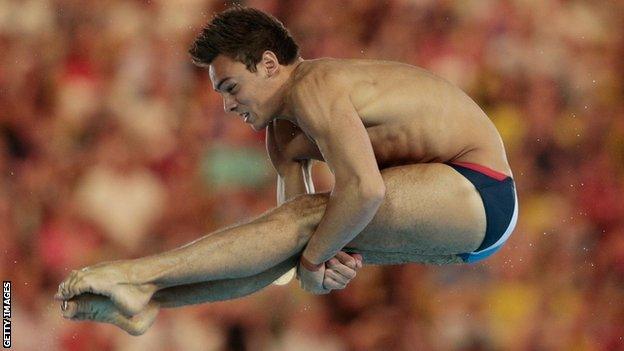
Tom Daley got better throughout the rounds on his way to winning a bronze
How he did it: Daley struggled in the preliminary round but improved in Saturday's semi-final and his upward curve continued into the final - although only after he successfully appealed that his first dive should be retaken after he was distracted by camera flashes. Daley took the slenderest of leads with his penultimate leap and only 0.15 points separated the top three in the final round but Daley's lower difficulty tariff saw him slip to third.
Interesting fact: Daley became Britain's youngest ever world champion in an Olympic sport when he clinched gold on the 10m platform in 2009 at the age of 15.
CANOEING - MEN'S 200M KAYAK PAIRS
How they did it: After qualifying fourth from their semi-final, the European champions got a good start and held off France's 2010 and 2011 world champions to grab the bronze behind Russia and Belarus.
Interesting fact: The pair are both 27, but from opposite ends of the country. Heath is from Guildford in Surrey, while Lancastrian Scofield is from Clitheroe.
How he did it: After easing through his first round clash, Muhammad lost in the quarter-finals to end his hopes of winning gold or silver. However, with the man who beat him - Nicolas Garcia Hemme - advancing to the final, Muhammad entered the repechage where he beat Arman Yeremyan 9-3 to land a bronze.
Interesting fact: Muhammad has been coached by his father Wayne since the age of three.
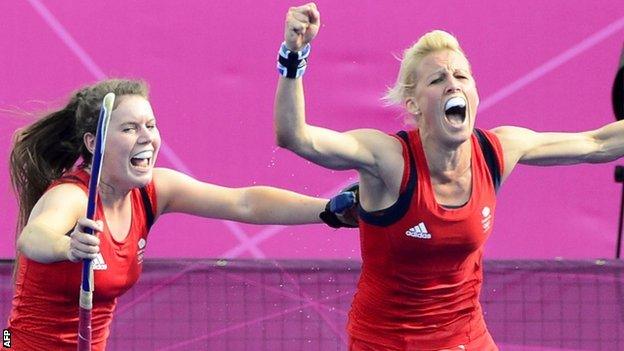
Alex Danson (right) celebrates after scoring for GB in the bronze medal match
How they did it: Great Britain beat New Zealand 3-1 at the Riverbank Arena to claim Olympic bronze in the women's hockey. With no score at half-time, goals from Alex Danson, Crista Cullen and Sarah Thomas sank the Kiwis.
Interesting fact: At the age of 14, Danson sang at Tim Henman's wedding in 1999. She was part of a church choir in Odiham in Hampshire.
How he did it: Despite losing his semi-final, Ogogo leaves London with a bronze medal thanks to making the last four after victory over Germany's Stefan Hartel in the quarter-finals.
Interesting fact: Ogogo appeared in Big Brother Celebrity Hijack, finishing fourth in the 2008 series.
EQUESTRIAN - INDIVIDUAL DRESSAGE
How she did it: On a historic day for British dressage Bechtolsheimer had set the standard with a score of 84.339, external which guaranteed GB a first individual dressage medal.
Interesting fact: Bechtolsheimer became the first Briton to win the World Cup Dressage Grand Prix in 2010, setting a new British record of 82.936 in the process.
How he did it: Grabarz put in a jump of 2.29m,, external and then had to wait to see if it was good enough for a medal. It was, with Grabarz sharing his medal with two others.
Interesting fact: In Helsinki earlier this year, he became the first British high jumper to win the European title since 1950.
How he did it: Jonny's older brother Alistair won gold, but the younger Brownlee overcame a 15-second penalty for mounting his bike too quickly to finish third.
Interesting fact: Jonny's Twitter bio, external reveals him to be a "full-time Footy Manager, FIFA and COD enthusiast. Part-time Triathlete".
GYMNASTICS - WOMEN'S UNEVEN BARS, external
How she did it: Tweddle went for maximum difficulty but took a big step on dismount to score 15.916 from her routine, Russia'a Aliya Mustafina scoring a massive 16.133 to take the gold medal.
Interesting fact: With four world titles and now a bronze medal, Tweddle is the most decorated GB gymnast in history.
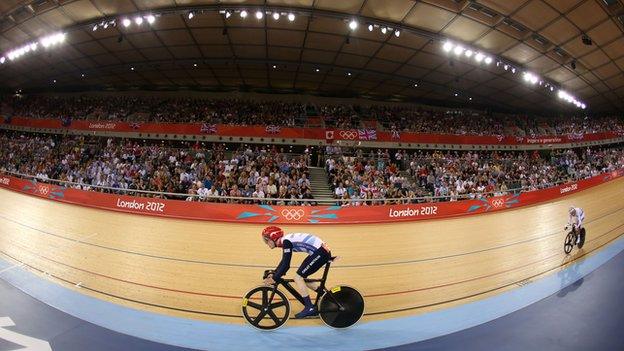
Ed Clancy had mixed results in the omnium but winning the final time trial secured the bronze
How he did it: Coming into the final event of the multi-discipline ominium, Ed Clancy sat in fifth place. Needing a victory in the 1km time trial to secure a medal, he delivered, finishing over 1.333 seconds, external ahead of his nearest rival to secure a bronze medal.
Interesting fact: This is the first time the omnium has been held at the Olympics, but Clancy took gold in the event at the 2010 World Championships.
GYMNASTICS - MEN'S POMMEL HORSE
How he did it: On his Olympic debut, Whitlock scored a superb 15.600, external handing him a bronze medal aged just 19.
Interesting fact: Max says his inspiration is Kohei Uchimura of Japan who took gold in the men's individual all-around event this summer.
SWIMMING - WOMEN'S 800M FREESTYLE, external
How she did it: The nation hoped Adlington would win gold again after her sensational performance in Beijing, but it was bronze this time as 15-year-old American Katie Ledecky blew away her rivals with a superb swim.
Interesting fact: No British swimmer has ever defended their title at an Olympic Games.
How she did it: Starting the final in lane eight, defending champion Adlington battled back from sixth place at the halfway point to claim bronze behind Allison Schmitt of the USA and France's Camille Muffat, who set a new Olympic record.
Interesting facts: In 2008, Adlington became Britain's first Olympic swimming champion since 1988 and the first British swimmer to win two Olympic gold medals since 1908. Her great uncle is former Derby County goalkeeper Terry Adlington.
How she did it: Karina Bryant beat Ukraine's Iryna Kindzerska in a bronze medal match in the women's 78+kg category.
Interesting facts: Bryant won silver at the 2009 World Championships and has a substantial medal tally, including four European gold medals and six in World Championships.
How he did it: Campbell won bronze in the men's single sculls, behind New Zealand's Mahe Drysdale who put in a brilliant second half of the race to hold off the challenge from Czech Republic's Ondrej Synek to win gold.
Interesting facts: The Northern Irish single sculler has also won medals at the last three world championships.
How they did it: Nash and Satch clinched bronze in the men's pair with New Zealand taking gold and France silver. France's Germain Chardin and Dorian Mortelette led through 500m before New Zealand's Eric Murray and Hamish Bond swept past them.
Interesting fact: Nash, studying engineering at Cambridge University, won silver in the men's four at the 2010 World Rowing U23 Championships in Brest, Belarus.
CYCLING - ROAD - MEN'S INDIVIDUAL TIME TRIAL
How he did it: With all eyes on Bradley Wiggins, Froome quietly got on with the task of getting himself on to the podium. Any hopes of a cycling one-two at the Games were dashed as Germany's Martin split the pair, showing why he is a world champion.
Froome eventually finished 26 seconds behind Martin and 68 seconds behind team-mate Wiggins, but can still be proud of his bronze medal.
Interesting fact: Froome was actually born and raised in Kenya but switched his nationality and began riding for Team GB in 2008.
EGINGTON - FOAD - LANGRIDGE - PARTRIDGE - RANSLEY - SBIHI - SEARLE - LOULOUDIS - HILL
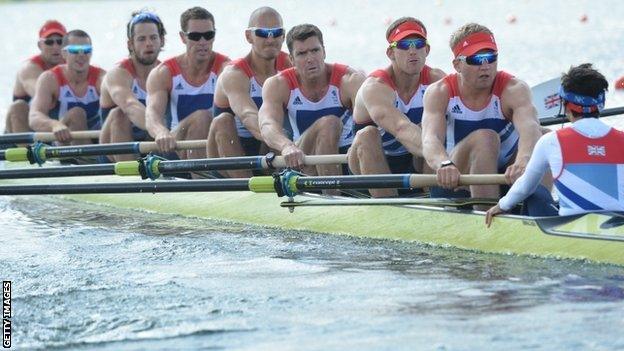
The British men's eight pushed Germany for most of the race but were moved into third by Canada
How they did it: After coming through the repechage to reach the final, Great Britain's men's eight pushed Germany for most of the race before the world champions pulled away and a late surge from Canada moved them down into third.
Interesting fact: Greg Searle won gold in the coxed pairs at the 1992 Barcelona Olympics with his brother Jonny.
SAM OLDHAM - DAN PURVIS - LOUIS SMITH - KRISTIAN THOMAS - MAX WHITLOCK
How they did it: Claiming Great Britain's first Olympic medal in team gymnastics for 100 years, Louis Smith and his team-mates were initially awarded the silver medal until a successful appeal saw Japan jump from fourth to second. However, the GB team still surpassed all expectations by winning bronze.
Interesting fact: Britain's last Olympic team gymnastics medal was also a bronze - in Stockholm in 1912.
- Published1 August 2012